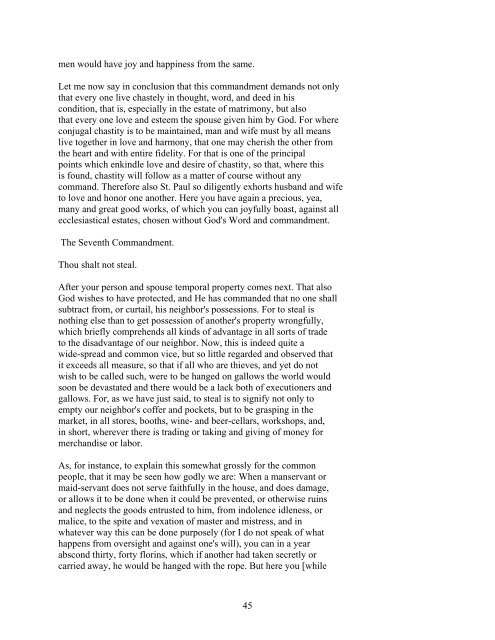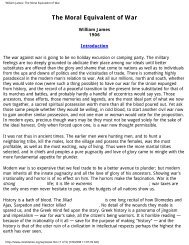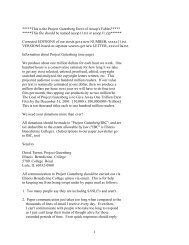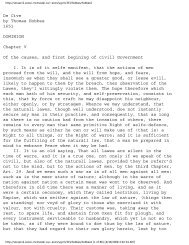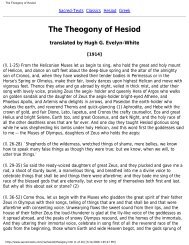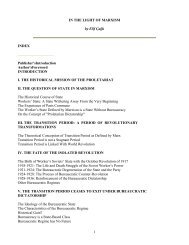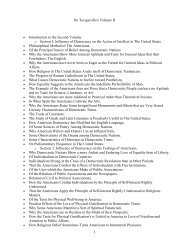Project Gutenberg Etext of The Large Catechism, by Martin Luther
Project Gutenberg Etext of The Large Catechism, by Martin Luther
Project Gutenberg Etext of The Large Catechism, by Martin Luther
You also want an ePaper? Increase the reach of your titles
YUMPU automatically turns print PDFs into web optimized ePapers that Google loves.
men would have joy and happiness from the same.<br />
Let me now say in conclusion that this commandment demands not only<br />
that every one live chastely in thought, word, and deed in his<br />
condition, that is, especially in the estate <strong>of</strong> matrimony, but also<br />
that every one love and esteem the spouse given him <strong>by</strong> God. For where<br />
conjugal chastity is to be maintained, man and wife must <strong>by</strong> all means<br />
live together in love and harmony, that one may cherish the other from<br />
the heart and with entire fidelity. For that is one <strong>of</strong> the principal<br />
points which enkindle love and desire <strong>of</strong> chastity, so that, where this<br />
is found, chastity will follow as a matter <strong>of</strong> course without any<br />
command. <strong>The</strong>refore also St. Paul so diligently exhorts husband and wife<br />
to love and honor one another. Here you have again a precious, yea,<br />
many and great good works, <strong>of</strong> which you can joyfully boast, against all<br />
ecclesiastical estates, chosen without God's Word and commandment.<br />
<strong>The</strong> Seventh Commandment.<br />
Thou shalt not steal.<br />
After your person and spouse temporal property comes next. That also<br />
God wishes to have protected, and He has commanded that no one shall<br />
subtract from, or curtail, his neighbor's possessions. For to steal is<br />
nothing else than to get possession <strong>of</strong> another's property wrongfully,<br />
which briefly comprehends all kinds <strong>of</strong> advantage in all sorts <strong>of</strong> trade<br />
to the disadvantage <strong>of</strong> our neighbor. Now, this is indeed quite a<br />
wide-spread and common vice, but so little regarded and observed that<br />
it exceeds all measure, so that if all who are thieves, and yet do not<br />
wish to be called such, were to be hanged on gallows the world would<br />
soon be devastated and there would be a lack both <strong>of</strong> executioners and<br />
gallows. For, as we have just said, to steal is to signify not only to<br />
empty our neighbor's c<strong>of</strong>fer and pockets, but to be grasping in the<br />
market, in all stores, booths, wine- and beer-cellars, workshops, and,<br />
in short, wherever there is trading or taking and giving <strong>of</strong> money for<br />
merchandise or labor.<br />
As, for instance, to explain this somewhat grossly for the common<br />
people, that it may be seen how godly we are: When a manservant or<br />
maid-servant does not serve faithfully in the house, and does damage,<br />
or allows it to be done when it could be prevented, or otherwise ruins<br />
and neglects the goods entrusted to him, from indolence idleness, or<br />
malice, to the spite and vexation <strong>of</strong> master and mistress, and in<br />
whatever way this can be done purposely (for I do not speak <strong>of</strong> what<br />
happens from oversight and against one's will), you can in a year<br />
abscond thirty, forty florins, which if another had taken secretly or<br />
carried away, he would be hanged with the rope. But here you [while<br />
45


